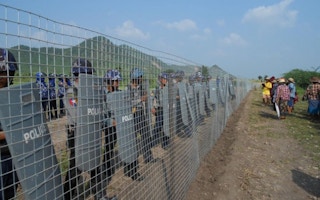A major international rights group is calling for Myanmar (also known as Burma) to halt construction of a copper mine complex and relocate an adjacent sulphuric acid factory amid significant environmental and human rights concerns. The site has had investment from Canadian and, more recently, Chinese corporations.
Alleged human rights abuses and corporate crimes at a foreign-owned copper mine in central Myanmar exemplify the moral and other hazards for investors in a country, which for the past several years, has been making a tenuous transition from military rule to partial democracy.
At a Bangkok news conference Tuesday, during which Amnesty International released a report about the Monywa project officials said it had been “marked by serious abuses for decades.”
That includes waves of forced evictions of thousands of people, environmental pollution and violent repression of protests by villagers left destitute by the project, said Amnesty International’s Meghna Abraham.
“The Monywa project has increasingly been seen as a test case for how serious the Myanmar government is about its reforms. And what we’re finding is that the government isn’t monitoring companies and it isn’t holding them accountable,” Abraham said. “So human rights abuses that have plagued this project from the very beginning continue to persist.”
“
The Monywa project has increasingly been seen as a test case for how serious the Myanmar government is about its reforms. And what we’re finding is that the government isn’t monitoring companies and it isn’t holding them accountable.
Meghna Abraham, corporate crimes researcher, Amnesty International
The project is also seen a prime example of the nexus among military-owned conglomerates, a small group of elite businessmen and foreign — especially Chinese — investors eager to access rich natural resources, such as oil, minerals and precious gems.
“We are seeing some encouraging changes in China, including some initiatives looking at possible standards in mining, et cetera,” Abraham said. “What we need now is for the Chinese government to take it to the next step and send a very clear signal to its companies that it will regulate their operations abroad.”
China North Industries Corporation, NORINCO, and Union of Myanmar Economic Holdings, UMEHL, in 2010 entered into an agreement to participate in the Monywa project.
One of the newer operations at the complex, known as the Letpadaung mine, is reportedly run by NORINCO subsidiary Wanbao and UMEHL, which is the economic arm of Myanmar’s military.
According to according to Amnesty researchers, Wanbao “directly engaged in forced evictions and colluded with the authorities, including by providing bulldozers to destroy crops,” in 2011.
Demonstrations have continued against the project. The most recent serious incident was this past December, when one woman died and several other people were injured when police opened fire on protesters at the Letpadaung site.
Ivanhoe Mines (now Turquoise Hill Resources), based in Canada, claimed in 2006 it was divesting of the Monywa project and established what it described as a third-party trust for its Myanmar assets. But Amnesty International says its investigation determined the Canadian company secretly kept control of the trust.
“All of this raises very serious concerns that economic sanctions might have been breached in the United Kingdom and Canada” because of sales of copper to a “who’s-who of the Myanmar military,” asserted Abraham.
The rights group has asked authorities in the U.K., Canada and the British Virgin Islands “to open investigations into these issues,” she said at the Bangkok news conference.
The government in Nay Pyi Taw and the involved companies in Myanmar have not engaged with Amnesty International but the rights groups says it has shared its findings with them.
Activists are calling on foreign entities to conduct due diligence before they invest in Myanmar to ensure people and the environment are adequately protected. And they want Myanmar’s government to impose stronger laws along those lines.

















